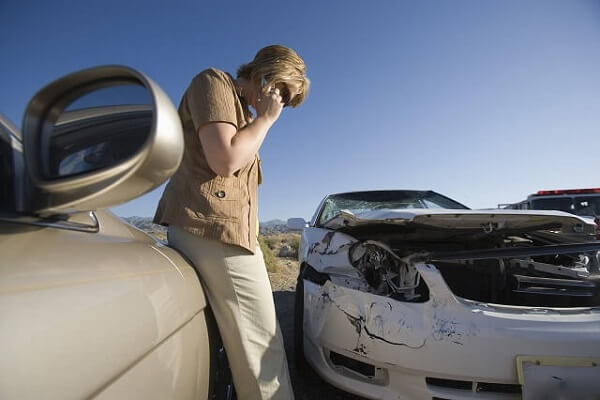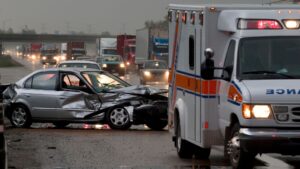
The following blog article was updated in January 2022.
When you are involved in a motor vehicle accident and the other driver caused that accident, you assume that they would be held responsible for your injuries. In most instances, this is the case. However, there are times when the driver is involved in an accident while performing their regular job duties. This scenario opens the potential for holding not only the employee but the employer responsible as well.
Determining when an employer is responsible for the actions of an employee is not easy. Instead, it comes down to the causes of the crash, the statute, and the employer’s role in the accident. Therefore, if you are involved in an accident with a commercial vehicle or an employee driving a company car, consult with an attorney to see if your case is one that falls under this exception.
Exploring Employer Liability in Mt. Vernon Car Accidents
When a motor vehicle accident happens and the driver was performing work duties, employers could be liable. Determining if you can hold that employer responsible means showing there is legal precedent to assign the responsibility from the employee over to the employer.
When Would Employers Be Liable?
There are a few situations where an employer might be liable for a car accident caused by an employee.
Employer Negligence
Sometimes, the employer’s negligence causes the accident – such as negligent hiring or supervision of an employee. When a company hires their workers, they are required to make sure that the worker is qualified and will not create hazardous conditions for the public. For example, if an employer hires a worker with a history of DUIs and allows them to drive a company vehicle, even though the employer is aware of the worker’s DUI record. By failing to exercise their reasonable due diligence and ensuring they put a safe driver behind the wheel of a company vehicle, they could be liable if that driver becomes intoxicated while driving a company car and causes an accident.
Bottom line, if an employee is using a company vehicle of any kind, the employer must ensure that the employee has the right license and that the license has not expired and has a solid driving record. Checking their past driving record and even performing intermittent drug and alcohol screening should also be done by an employer to ensure their driver is complying with company protocols and state regulations.
Another example would be an employer blatantly ignoring safety regulations. For instance, a commercial truck company forces its employees to work beyond the federal maximum allowed hours.
Negligent Supervision
Negligent supervision is another way in which employers take responsibility of an employee-caused accident. Employers must have safety protocols in place and should enforce them with all workers. Furthermore, they must ensure their drivers follow all state or county safety laws.
For example, a company with commercial truck drivers must ensure its drivers follow all state and federal trucking laws. When employers fail to check and ensure these drivers are exercising a reasonable duty of care or complying with local regulations, they could be held at fault for that negligent supervision.
Vicarious Liability
Under vicarious liability, the employer might not need to be negligent. Instead, this doctrine of the law allows a person to ascertain that the actions of the employee are still the responsibility of the employer – despite the employer not being negligent.
For example, the employee uses a company car to pick up documents at the local copy shop. On the way there, they run a red light and cause an accident. Because they were running an errand for the company as part of their job duties, under vicarious liability, the employer may still be liable for the incident despite doing nothing wrong themselves.
Vicarious liability works both ways. An employer is not automatically responsible for everything their workers do. For example, the employee was not running a job errand and was in an accident on their way to work. Because they were not performing job duties and not currently on the clock, the employer is unlikely to be found responsible through vicarious liability.
The Going and Coming Rules
Realize that under the going and coming rules, employers are not liable for employee car accidents if the employee’s incident occurs during non-working hours – including their commute. Even if the employee were in a company car at the time, the employer would not be liable because the employee was not working as an agent of the company during the accident.
Employer Liability Is a Complex Area of the Law
Holding employers responsible for the actions of their workers is a complicated area of the law that is best left to attorneys. If you are injured in a car accident with an employee and you are curious if you could hold the employer liable, you need to speak with an attorney.
If the insurance coverage or assets of the driver are inadequate, do not assume that you can use a suit against the employer to fill that gap. Specific legal theories must be proven by a preponderance of the evidence in order to win your case.
Meet with an Attorney Regarding Your Accident Today
After a severe car accident, you should not have to worry about researching employer liability as it pertains to a car accident. Instead, you need to focus on recovering.
Speak with an attorney from Brett McCandlis Brown & Conner, PLLC. Our attorneys are here to help you seek compensation for your injuries, and we aggressively fight against insurance companies until our clients receive the damages they deserve.
Schedule a free consultation today at 206-922-4197 or request more information online.


